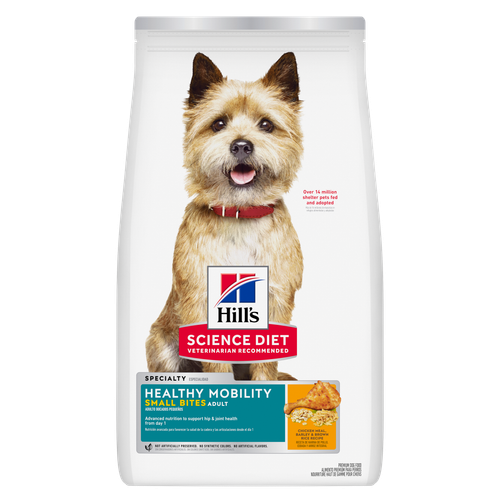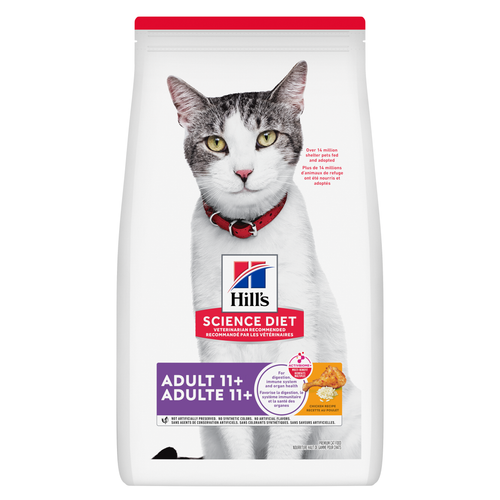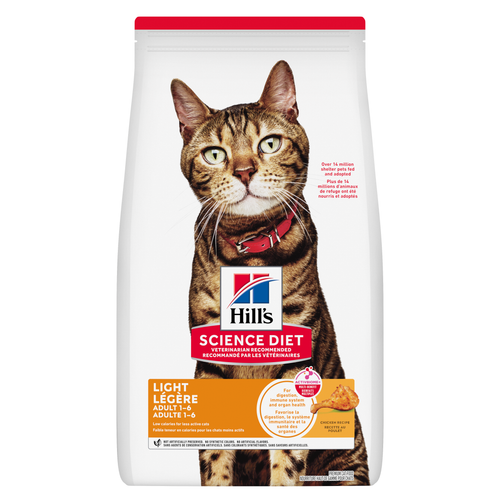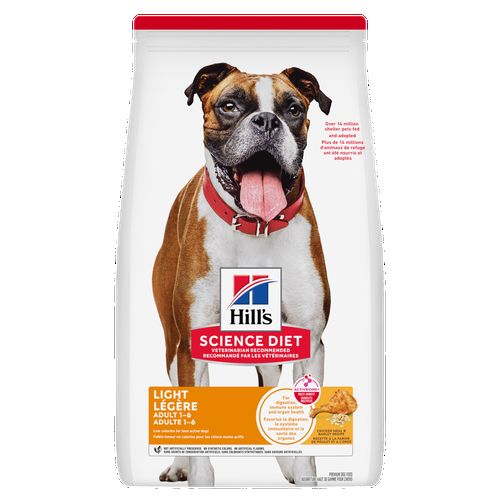
-
Find the right food for your petTake this quiz to see which food may be the best for your furry friend.Find the right food for your petTake this quiz to see which food may be the best for your furry friend.Featured products
 Adult Light Large Breed Chicken Meal & Barley Recipe Dog Food
Adult Light Large Breed Chicken Meal & Barley Recipe Dog Food18% lower calories vs. Science Diet Large Breed Adult
Shop Now Adult Sensitive Stomach & Skin Small & Mini Chicken Recipe Dog Food
Adult Sensitive Stomach & Skin Small & Mini Chicken Recipe Dog FoodHill's Science Diet Sensitive Stomach & Skin Small & Mini dry dog food is tailored nutrition for Small & Mini dogs while being gentle on stomachs. Nourishes skin & promotes a lustrous coat.
Shop Now Adult Healthy Mobility Small Bites Chicken Meal, Barley & Brown Rice Recipe Dog Food
Adult Healthy Mobility Small Bites Chicken Meal, Barley & Brown Rice Recipe Dog FoodAdvanced nutrition to support hip & joint health from day 1
Shop NowFeatured products Adult 11+ Chicken Recipe Cat Food
Adult 11+ Chicken Recipe Cat FoodSupports brain health & beautiful fur. Helps keep immune system, heart & kidneys healthy.
Shop Now Adult Healthy Cuisine Seared Tuna & Carrot Medley Cat Food
Adult Healthy Cuisine Seared Tuna & Carrot Medley Cat FoodDelicious seared tuna paired with tender carrots in a mouthwatering sauce
Shop Now Adult Light Chicken Recipe Cat Food
Adult Light Chicken Recipe Cat Food20% lower calories vs. Hill's Science Diet Adult
Shop Now -
Dog
- Dog Tips & Articles
-
Health Category
- Weight
- Food & Environmental Sensitivities
- Urinary
- Digestive
- Joint
- Kidney
- Dental
- Cancer
-
Life Stage
- Puppy Nutrition
- Adult Nutrition
- Senior Nutrition
Cat- Cat Tips & Articles
-
Health Category
- Weight
- Skin & Food Sensitivities
- Urinary
- Digestive
- Kidney
- Dental
- Stress
- Cancer
-
Life Stage
- Kitten Nutrition
- Adult Nutrition
Featured articles Importance of DHA in your Pet's Food
Importance of DHA in your Pet's FoodLearn about DHA, Docosahexaenoic Acid, a natural omega-3 fatty acid that is essential in the development of the brain and nervous system in cats & dogs.
Read More Water
WaterDiscover why water is the most important nutrient for your dog or cat to live a healthy life. Find out how much water your pet should consume each day.
Read More Antioxidants
AntioxidantsUnderstand the importance of antioxidants in your dog or cat's food, and how they can help protect your pet and keep them healthy.
Read More -


If you've ever taken your dog out in the snow, chances are that they sneaked a lick (or a chomp) of the cold stuff. But why do dogs eat snow? And is it safe? If you've ever been concerned that your dog ate snow, here's what you need to know.
Why Do Dogs Eat Snow?

Only dogs know for certain why they enjoy eating snow, but there are several possible reasons for the behavior:
- They're thirsty: Unless you've just filled your pup's water bowl, their water might not be the freshest. But it doesn't get much fresher or cleaner than newly fallen snow.
- It's in their DNA: Before dogs were domesticated, their ancestors in colder climates often had to rely on eating snow to hydrate. It is possible that that innate behavior still exists coded in their DNA thousands of years later.
- They have a health condition: If your pooch eats snow obsessively, check with your veterinarian. It could be a sign of Cushing's disease or thyroid or kidney problems, says Petful. PetHelpful adds that some dogs eat snow for the same reason they eat grass: to induce vomiting in order to settle an upset stomach.
- They just like it: It's probably curiosity that first prompts a dog to nibble on snow. Whether it's the taste, the texture or the cold sensation, something about that first bite provides enough pleasure to encourage them to keep doing it.
Is It Safe for Dogs to Eat Snow?

As long as the snow is clean, it's safe for dogs to eat in small quantities. The danger comes primarily from toxic substances, such as ice melt or antifreeze, that might contaminate the snow. And eating snow in large quantities could dangerously lower your dog's body temperature.
Another danger is that your dog might bite down on or consume harmful objects, such as sticks, rocks or trash that's buried beneath the snow. These could break teeth, cause choking or, if swallowed, cause intestinal damage or blockage that could necessitate surgery.
Never let your dog eat dirty, discolored or partially melted snow, or snow that covers roads, sidewalks or other heavily trafficked areas. And under no circumstances should you allow your dog to eat snow that's been driven on or piled up by a snowplow. If your dog ate snow that gives you cause for concern, give your vet a call.


Tasty Tips
How to Discourage Your Dog From Eating Snow
It might be impossible to prevent dogs from eating snow entirely, but here are a few things you can do to discourage your dog from turning the next snowfall into a buffet:
- Provide them with plenty of clean drinking water that you refresh regularly.
- Use a leash when walking your dog in the winter. Try to avoid snow, especially puddles of melted snow, as these are more likely to contain chemicals.
- Bring a toy or treats on your walk to distract your dog from the snow.
- Either put booties on your dog when going out or thoroughly clean their paws when they return inside from the snow.
It's normal for dogs to enjoy noshing on snow once in a while. Just remember that it's up to you, as a pet parent, to make sure they don't consume anything harmful along with the snow. Of course, despite your best efforts, your dog might find a way of eating something they shouldn't. If this happens, don't panic. Instead, seek your vet's opinion.


Jean Marie Bauhaus is a pet parent, pet blogger, and novelist from Tulsa, Oklahoma, where she usually writes under the supervision of a lapful of fur babies.
Related products

Advanced nutrition to support hip & joint health from day 1

Hill's Science Diet Sensitive Stomach & Skin Small & Mini dry dog food is tailored nutrition for Small & Mini dogs while being gentle on stomachs. Nourishes skin & promotes a lustrous coat.

18% lower calories vs. Science Diet Large Breed Adult

18% lower calories vs. Science Diet Adult
Related articles

Learn how dogs with sensitive skin can have special dietary needs, how they can develop over time in a healthy dog, and how Hill's dog food can help.

Learn basic steps & precautions for treating a cut on your dog, including what you can put on the cut, and when you should take them to the vet.

Your dog's coat and skin are a big part of your dog's overall health. Ensure you keep your dog's coat healthy, by following these simple tips.

Discover how the field of dog science is giving us more and more insights into the inner workings of our furry best friends.

Put your dog on a diet without them knowing
Our low calorie formula helps you control your dog's weight. It's packed with high-quality protein for building lean muscles, and made with purposeful ingredients for a flavorful, nutritious meal. Clinically proven antioxidants, Vitamin C+E, help promote a healthy immune system.
Put your dog on a diet without them knowing
Our low calorie formula helps you control your dog's weight. It's packed with high-quality protein for building lean muscles, and made with purposeful ingredients for a flavorful, nutritious meal. Clinically proven antioxidants, Vitamin C+E, help promote a healthy immune system.

